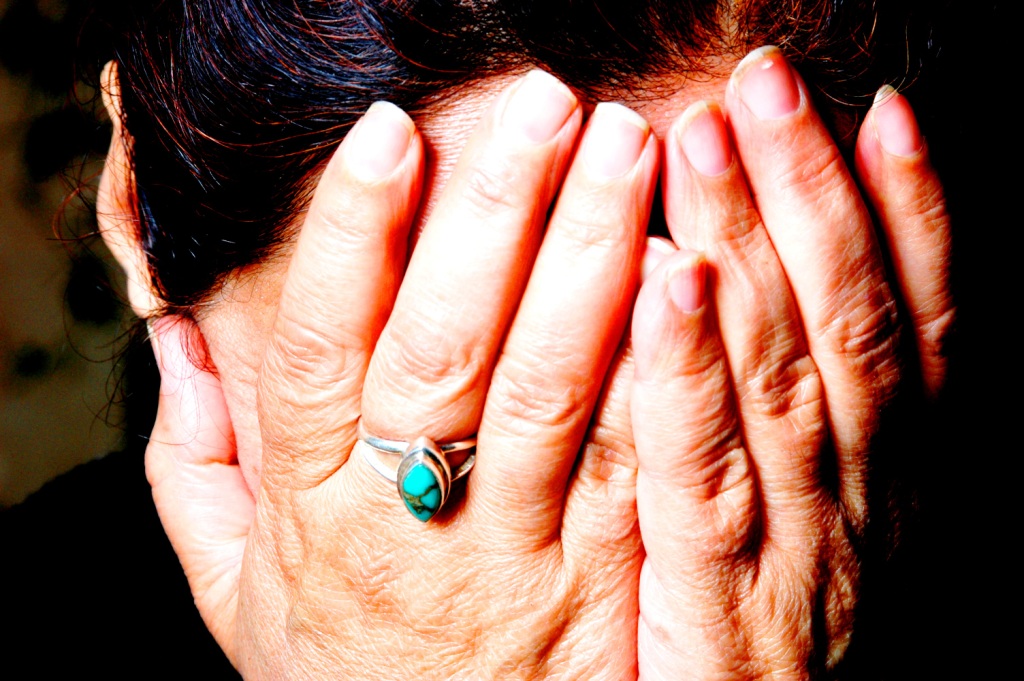“The only difference between a rut and a grave are the dimensions.” ― Ellen Glasgow
How’s your tolerance for stress?
I’m guessing it’s pretty good.
Stress is such a part of life these days that we have become experts at putting up with it.
I used to be a champion at taking stress in my stride…but now I know how dangerous that can be.
My Dangerous Flirtation With Stress
I had a big job at the big end of town. Good money and good Friday nights were sufficient compensation, I thought, for the crazy hours I endured.
Running a professional program for budding chartered accountants shouldn’t have been such a high-pressured gig. But being responsible for about 1,000 of them at a time, and with a punishing schedule, it was crippling.
But I soldiered on. I was proud of the braveface and determination I wore as armor.
Aside from brief bouts of snappiness or tears, I kept afirm lid on my emotions. Being so wired, big Friday nights were justified ways of letting off steam.
There was no room for regret either. I just propped myself up martyr style —feeling self-righteous for my herculean efforts in a high-pressure, under-resourced workplace.
I think you’d probably say my way of “coping”was understandable. In fact, you might say I did OK.
But think again.
How “Coping OK” Only Deepens The Rut
I had staked a lot on this job. I saw it as an excellent next step and resisted facing the reality that it was not what I’d hoped. I wasn’t ready to accept a new uncertainty, and to change my plans.
Without awareness, I chose to hang on to a situation that turned out to be bad for me, and I was making it worse.
I was getting by on sheer determination and intermittent partying, sustaining myself in a rut…as the pressure continued to build.
I was like the proverbial frog in hot water, unwittingly edging toward the boiling point.
Something had to give and it did —my health. An auto-immune disease I’d kept in check for years reappeared. Who could be surprised given that my sleep, nutrition, leisure and social connections had all suffered?
I remember dashing between my desk and the printer actually wincing from pain. It was like my body was screaming at me to wake up to myself.
It was only the shock resignation of a close work friend that finally snapped me to my senses.
I quit and did some contract work while I pondered my future. I restored a healthy lifestyle and recovered. In as much as it was a confronting and painful time of uncertainty, it also set me up for a better, healthier future.
10 Common Stress Reactions That Only Make Things Worse
I was lucky to have leapt out of the hot water after a risky period of coping.
But we have all witnessed others who were not so lucky (or perhaps you yourself have come to harm). People go on to suffer anxiety and depression, lose careers and relationships, or succumb to addictions and other destructive behaviors.
What kind of copingstopped them (or you) from leaping out of harm’s way? Which of these 10 reactions fostered a dangerous tolerance for stress?
1. Minimizing —you tell yourself and others it’s “no biggie.”
You downplay your difficulties, forever pointing at someone who is worse off. You dismiss your challenges saying, “It is what it is.” Your feelings are suppressed, nothing changes, and the pressure within you continues to build.
What to do instead: Dare to acknowledge that thing’s aren’t great, and that it’s human to have feelings about that.
2. Distraction —you look everywhere except at your issues
Filling every moment of every day is easier than ever. You can squeeze out any doubt or niggling aspects of your life. You keep your head down and don’t stop. Problems fester but work, kids, social media and endless apps mean never having to feel anything much at all.
What to do instead: Take the difficult step to schedule time to tune in…journaling, meditation, catching up with a sensible friend. You need a regular activity that involves stopping and setting devices aside.
3. Numbing —you use or abuse a substance or behavior which numbs bad feelings
Tired…bored…disgruntled? No problem. Any pain or discomfort can be quelled. Any mood lifted or calmed. You can reach for a caffeinated or alcoholic drink, prescription or party drugs. Gaming, shopping and eating offer an immediate “fix”for stress (but unfortunately they are also a significant source of it).
What to do instead: Choose healthy activities that promote good feelings,and that build your awareness and tolerance for more challenging sensations (e.g., walking, martial arts or yoga).
4. Wallowing —you opt for a pity party to get some relief, but get stuck there
Venting emotion can alleviate anguish. That’s good if it provides impetus to constructively respond to issues. However, take care not to settle for a difficult situation and wear the stress as a badge of honor.
What to do instead: Choose a venting partner with a healthy and realistic perspective.
5. Denial —you cannot admit there is adversity in your life
We may be adept at recognizing denial in others, but it is harder to notice in ourselves. Warning signs include adopting an absolute positive mantra —like “it’s all good”—when things are bad.
What to do instead: Wherever possible, own up to what’s challenging right now and strike a balance between positive and negative. “Mum’s not well but we’re trying to make the best of it.”Or, “Business is tough; I have good and bad days.”
6. Isolation —you struggle to ask for and to receive support, preferring to tough it out alone
Independence can be a strength, but if it is driven by a fear of burdening others, or of being vulnerable in their presence, be wary of it.
Withdrawal is a symptom of stress and depression. Don’t give in to it.
What to do instead: Choose less demanding people or situations, but stay socially active —let those close to you know you’re not at your best and that you need them to push you.
7. Acting invincible —you say, “Bring it on!”
Being under the pump gives you a buzz. Adrenaline is addictive. And feeling invincible is more alluring than feeling vulnerable.
You derive satisfaction from working, training, doing everything harder, longer, faster. But at what cost? Where do you draw the line? Are you even able to draw a line?
What to do instead: Schedule commitments that force you to stop your busyness at a set time —a long weekend, a dinner date, a massage.
8. Self-blame —you feel certain that you have brought this on yourself
This reaction is often fostered in childhood. You get told, “Cheer up, stop making a fuss, what’s the matter with you?”This provides a solid grounding in self-recrimination.
You believe you should cope better. You admonish yourself for seeing the glass as half empty, and all the while add to your stress.
What to do instead: Remind yourself that stress and stress symptoms are real and universal. Picture how you would respond to a friend in your shoes and try showing yourself the same compassion.
9. Striving —“never say die”is your motto
You struggle to say “no”or to ever cut corners. The risk of not delivering is ever-present and an enormous strain. Being the go-to person feels good, but always saying “yes”is not sustainable.
The perfectionist whose high standards are a crutch for feeling in control is especially at risk of worsening stress in this way.
What to do instead: Seek out opportunities to say “no,” or to try out lowering your standards. These are new muscles you need to flex and strengthen.
10. Overthinking —you try to think your way out of uncertainty and ambiguity
Change and unpredictability are stressful and anxiety provoking. You want answers and you want to be able to make decisions. Being stuck in the unknown is unbearable for you. Your head goes into overdrive, trying to think your way out of there.
Do take pride in your intellect and analytical skills, but beware, no amount of thinking can turn grey into black-and-white.
Constantly thinking things through and rehearsing in your mind can lead to rumination and obsession.
What to do instead: Learn to catch yourself overthinking. Let yourself write down your thoughts once, or set a five-minute time limit. Employ healthy distractions or a trusted friend to help you be vigilant in catching and stopping yourself.
So what will you do instead?
Don’t be a champion at taking stress in your stride, like I was.
Because coping just deepens the rut.
Take a moment now to picture the last time you were stressed and notice how you responded —do you recognize any of the strategies above?
If so visualize doing something different instead.
And when stress visits you again, be ready to try your new way.
Dare and commit —feel the heat of stress and respond with new awareness.
It’s time to make things better, not worse.
Photo by Sodanie Chea






It is so true that we seem to be more resilient to stress – and at a price. I also find it so sad that vulnerability in the corporate world is not tolerated – or so most corporate employees believe. Many successful corporate people have used my coaching room as a place to be vulnerable – it is often such a relief for them to talk about their fears and concerns in a safe place.
Thanks for sharing your thoughts on stress – so pertinent today!
Pleasure Kirsten and thanks for your insights. It is sad, sad that we often tend to numb, distract and “cope” so as not to feel vulnerable, or feel anything much at all.
And we all lose because numbing diminishes feelings, passion and instincts…and so too courage, creativity and innovation.
Pleasure Kirsten and thanks for your insights. It is sad, sad that we often tend to numb, distract and “cope” so as not to feel vulnerable, or feel anything much at all.
And we all lose because numbing diminishes feelings, passion and instincts…and so too courage, creativity and innovation.
Thank you so very much for sharing this! This was the answer I’ve been praying about for days!
I’m so pleased if it’s helpful to you Kelli!
Thanks for this article! I never really realized that I was guilty of so many of these..
Hopefully it will start helping my stress levels at work
Hi Cathy, I’m pleased – it’s great if you can reflect on the different ways that you react to pressures at work. That awareness goes along way to helping with stress levels….you feel less a hostage to your reactions and more able to respond as you’d wish.
Funny my boss posted this because she is doing and causing all of the above in our lives! Hope she reads it herself properly!
It’s really tough when you work in a place where high levels of sustained stress are accepted as the norm, and where unhelpful ways of “coping” become entrenched. All the best with finding a way through that works for you, your health and wellbeing.
Stress is one of the biggest problems in our lives, but majority of people simply brush it off until it takes toll.
Your writing is so powerful and I agree with what you said – it’s time to slap stress back.
Glad it chimed with you Phil, and I couldn’t agree with you more. It’s like a time bomb ticking and nobody’s taking much notice!
Hi Jacqueline
This was a great post chock full of helpful advice. It is interesting because it seems in today’s world, so many people take some sort of weird pride in leading really stressful lives, and how much ‘crap’ they can handle. And this tendency is definitely not good for the individual or society as a whole. I think this is a particular problem in America, where many people view taking a vacation as not being dedicated to the job, and leaves many workers reluctant to take even the full paltry two weeks given. Meditation has really helped me deal with stress and negative emotions in many ways, namely by helping to strengthen that space between my ‘real’ self and all my thoughts and feelings. I am just more accepting of these states, and don’t resist them as much. That lack of resistance reduces the intensity, and even if I’m still not feeling great, it is not as ‘dramatic.’
Kelli,
The real problem with vacation is that many people do not take one (a good one rather, one that “works”) because here in the U.S.A. most workers do not get enough time. We lag behind many “1st world” and even “3rd world” (for lack of better phrases) countries in the amount of paid time off…
Hey Kelli, it’s so true and a great worry — the “badge of honour” that society commonly awards to high levels for stress. Mindfulness, meditation and the like are a terrific antidote, yes. Fostering self-compassion and resilience, as you’ve clearly achieved.
I do find that those practices are often represent a huge leap for many, so I’m very focussed at present on bridging that gap — helping regular people take manageable steps to create that space and reduce the intensity and drama you so aptly describe!
Thanks for sharing.
Hi Jacqueline,
This is such an important article. I am the one who always had to go it alone. Be strong, tough and then go home and cry. It took a long time before I realized what I was doing and to step away to a happier place. Great advice! Learning to watch yourself takes time, but is so rewarding.
Thanks Carolynne, generous of you to share — to let others know that change is possible, not easy but worth it!
I’m a therapist and many times my clients say “oh, it’s just stress.” People so underestimate the negative effects of stress. Many of my clients, especially the women, use food to cope with stress (which I’ve recently written about). I do lots of education around this and appreciate your succinct suggestions. I’ll add your site as a resource.
Hi Holly, thanks. I’m also a therapist and have had the same experience —my initial motivation behind Wise Stress Mastery was to develop resources for clients to use outside of their sessions. It really is a pervasive problem.
How did you know my story so perfectly? I felt like I was reading this about my old life, right down to the pain and then resigning, contracting etc.
So beautifully written and I am sure many people will recognise this in themselves. It’s nice to know there is someone like you who is teaching people to recognise this before it becomes a life threatening illness.
Keep being amazing, Bel
Hey Bel, clearly we’re not alone in our stress stories! Isn’t it a shame what we put ourselves through. Glad to hear it’s your “old life”. And thank you so much for your appreciation and encouragement.
Here is something from Maxwell Maltz’ book Psycho-Cybernetics that has helped me.
“Relaxation of muscles brings about mental relaxation, or a peaceful relaxed attitude.
Thus, relaxation is nature’s own tranquilizer, which erects a psychic screen or umbrella
between you and the disturbing stimulus.”